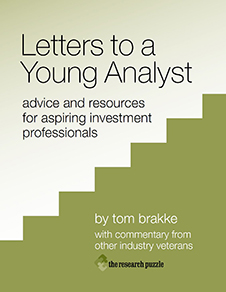
- Saturday, March 20th, 2010
- competitive yoga
-
We had an early dinner on St. Patrick’s Day in the back room of the local pub, where the shouting of the raucous revelers around the bar was muted a bit.
The females at the table started talking about yoga. Specifically, the conversation touched on a woman known to be exceptional at everything she tries, no matter the field of endeavor (don’t you just hate that), who had started coming to yoga classes. She was just a beginner, but was already very good at it, just like everything else. There was a tone of envy.
I remarked: “I didn’t know that yoga was a competitive sport.” By explanation, I was told, “It’s just human nature.”
We can’t get away from comparing ourselves to others, no matter how destructive the act of comparison might be. The process of investing is one of the greatest examples of that. While each of us should have individual goals that reflect our own liabilities, circumstances, skills, resources, and behavioral make-up — and should adopt strategies that reflect them — we are repeatedly conned into playing someone else’s game. We are lulled into the belief that there’s a big measuring stick in the sky to which we need to compare ourselves.
Nonsense.
There is nothing sillier than a retiree with five million dollars comparing his equity returns to the S&P 500. In all likelihood, the only big mistake that he can make is to incur too much risk, yet he judges his performance in comparison to a particular benchmark because everyone else uses it, and will evaluate his advisors or mutual funds or whatever on that basis, even though the act of comparison invites errors.
The investment world is full of such behavior. The entire counterproductive relative performance structure of institutional money management is the greatest example, causing investors large and small to make bad decisions in the guise of making good ones. And then there are our tendencies to follow gurus that advocate strategies that make no sense for us, to copy trades posted online by others because they were “right” last time, and to feel left out if our neighbor said he made a killing in something that neither of us understands.
Our decision on St. Patrick’s Day to celebrate in a different way than the mob (insert old folks joke here) was a good one. We had a wonderful time, because we weren’t afraid to have our own kind of party. The willingness to be detached from the crowd is also the first step to finding an investment approach that makes sense.
Like yoga, investing should be an intensely personal activity. You should observe and learn from others without measuring yourself by them. But we have difficulty doing so. It is human nature to invent performance games and, as if to prove the point, someone did create “competitive yoga,” a sport they would like to get into the Olympic games. (Announcer: “Did you see that? From ‘happy baby’ backwards over the head to ‘downward dog’ has never been done before. Incredible!”)
It is important to evaluate your investment approach with great rigor. But it is critical to remember that looking across the market room at what someone else is doing is unlikely to lead you to your own personal investment nirvana.
